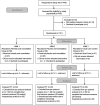A Randomized Three-Arm Double-Blind Placebo-Controlled Study of Homeopathic Treatment of Children and Youth with Attention-Deficit/Hyperactivity Disorder
- PMID: 37672605
- PMCID: PMC10960167
- DOI: 10.1089/jicm.2023.0043
A Randomized Three-Arm Double-Blind Placebo-Controlled Study of Homeopathic Treatment of Children and Youth with Attention-Deficit/Hyperactivity Disorder
Abstract
Objectives: Approximately 30% of children diagnosed with attention-deficit/hyperactivity disorder (ADHD), the most prevalent mental health disorder in children worldwide, do not respond to conventional pharmaceutical treatments. Previous studies of homeopathic treatment for ADHD have been inconclusive. The objectives of this study were to determine if there (a) is an overall effect of homeopathic treatment (homeopathic medicines plus consultation) in the treatment of ADHD; (b) are any specific effects the homeopathic consultation alone in the treatment of ADHD; and (c) are any specific effects of homeopathic medicines in the treatment of ADHD. Design: The design was a randomized double-blind placebo-controlled clinical trial. Setting/Location: Toronto, Canada. Subjects: Children aged 6-16 years diagnosed with ADHD. Interventions: Participants were randomized to one of three arms: Arm 1 (Remedy and Consultation); Arm 2 (Placebo and Consultation); or Arm 3 (Usual Care). Outcome Measures: Primary Outcome was the change of CGI-P T score between baseline and 28 weeks. Results: There was an improvement in ADHD symptoms as measured by the Conner 3 Global Index-Parent T-score in the two groups (Arms 1 and 2) that received consultations with a homeopathic practitioner when compared with the usual care control group (Arm 3). Parents of the children in the study who received homeopathic consultations (Arms 1 and 2) also reported greater coping efficacy compared with those receiving usual care (Arm 3). There was no difference in adverse events among the three study arms. Conclusions: In this study, homeopathic consultations provided over 8 months with the use of homeopathic remedy was associated with a decrease in ADHD symptoms in children aging 6-16 years when compared with usual treatment alone. Children treated with homeopathic consultations and placebo experienced a similar decrease in ADHD symptoms; however, this finding did not reach statistical significance when correcting for multiple comparisons. Homeopathic remedies in and of themselves were not associated with any change in ADHD symptoms. Clinical Trial Registration: This trial was registered on ClinicalTrials.gov; NCT02086864.
Keywords: ADHD; attention-deficit/hyperactivity disorder; complementary and alternative medicine; homeopathy; mental health; pediatrics.
Conflict of interest statement
D.B. is owner of a commercial homeopathic clinic and retail supplies outlet: Riverdale Homeopathy (1749863 Ontario Ltd.). All other authors declare that they have no competing interests.
Figures
Similar articles
-
Homeopathy for attention-deficit/hyperactivity disorder: a pilot randomized-controlled trial.J Altern Complement Med. 2005 Oct;11(5):799-806. doi: 10.1089/acm.2005.11.799. J Altern Complement Med. 2005. PMID: 16296913 Clinical Trial.
-
A Phase III, Randomized, Double-Blind, Placebo-Controlled Trial Assessing the Efficacy and Safety of Viloxazine Extended-Release Capsules in Adults with Attention-Deficit/Hyperactivity Disorder.CNS Drugs. 2022 Aug;36(8):897-915. doi: 10.1007/s40263-022-00938-w. Epub 2022 Jul 27. CNS Drugs. 2022. PMID: 35896943 Free PMC article. Clinical Trial.
-
Homeopathic treatment of children with attention deficit hyperactivity disorder: a randomised, double blind, placebo controlled crossover trial.Eur J Pediatr. 2005 Dec;164(12):758-67. doi: 10.1007/s00431-005-1735-7. Epub 2005 Jul 27. Eur J Pediatr. 2005. PMID: 16047154 Clinical Trial.
-
[Atomoxetine: a new treatment for Attention Deficit/Hyperactivity Disorder (ADHD) in children and adolescents].Encephale. 2005 May-Jun;31(3):337-48. doi: 10.1016/s0013-7006(05)82399-1. Encephale. 2005. PMID: 16142049 Review. French.
-
Immediate-release methylphenidate for attention deficit hyperactivity disorder (ADHD) in adults.Cochrane Database Syst Rev. 2021 Jan 18;1(1):CD013011. doi: 10.1002/14651858.CD013011.pub2. Cochrane Database Syst Rev. 2021. PMID: 33460048 Free PMC article.
References
-
- Hahnemann S. Organon of the Medical Art 6th edition (1842) (transl. O'Reilly). Birdcage Press: Palo Alto; 1996.
Publication types
MeSH terms
Substances
Associated data
LinkOut - more resources
Full Text Sources
Medical

